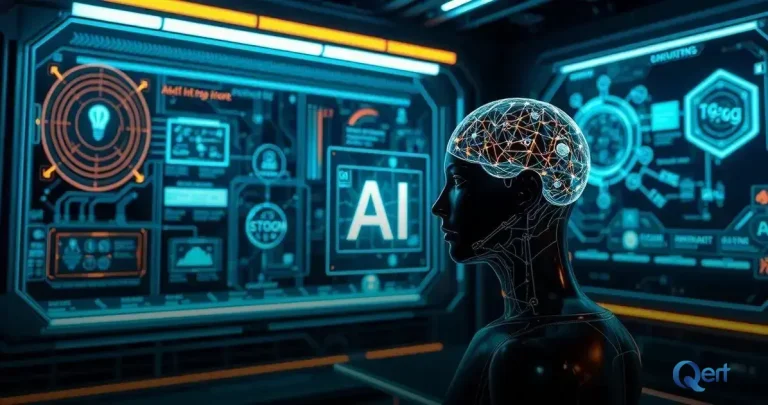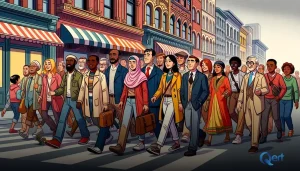ADVERTISEMENT
What is AI? It refers to the simulation of human intelligence in machines designed to think and act like humans.
AI is reshaping industries, enhancing efficiencies, and providing invaluable insights across various sectors.
What is AI?
What is AI? It stands for Artificial Intelligence, which means creating machines that can think and learn like humans.
These machines can perform tasks that usually require human intelligence, such as understanding language, recognizing images, and making decisions.
AI systems learn by analyzing huge amounts of data. They identify patterns and relationships within the data, which helps them improve over time.
This means AI can become smarter and more effective as it processes more information.
Today, AI is everywhere, from virtual assistants on our phones to recommendation systems on streaming services.
By making daily tasks easier and faster, AI is truly transforming how we interact with the world around us.
How AI Works
How AI works is fascinating and involves a few important steps. First, AI systems start by gathering and processing a large amount of data.
This data can come from many sources, such as text, images, or videos. The more data an AI has, the better it can learn.
Next, AI uses algorithms to find patterns in this data. Algorithms are like sets of instructions that tell the machine what to look for.
By using these patterns, AI can start to make predictions or decisions based on new information that it encounters.
Finally, AI continues to improve by learning from its experiences. When it gets feedback on its decisions, it adjusts its algorithms to become even smarter.
This ability to learn and adapt is what makes AI so powerful and useful in our everyday lives.
Real-World Applications of AI

Real-world applications of AI are all around us, making life easier and more efficient.
In healthcare, for example, AI helps doctors diagnose diseases by analyzing medical images and data quickly. This can lead to faster treatments and better patient outcomes.
Another area where AI shines is in transportation. Many companies use AI for self-driving cars that can safely navigate roads.
These cars rely on sensors and data to understand their surroundings, reducing accidents and improving traffic flow.
AI also plays a significant role in everyday tasks, such as virtual assistants on our smartphones.
These assistants can schedule appointments, send texts, and answer questions, making our daily routines smoother and more manageable.
Benefits of AI in Daily Life
The benefits of AI in daily life are numerous and impactful. One major advantage is increased efficiency.
AI tools can handle repetitive tasks quickly, allowing people to focus on more creative and important work.
For example, AI can sort emails or manage schedules, saving time and reducing stress.
Another benefit is how improves personalization in services.
From streaming music to shopping online, AI analyzes your preferences and suggests content or products that match your taste.
This makes experiences more enjoyable and tailored to individual needs.
Finally, enhances safety in daily activities. For example, smart home systems can detect unusual activity, alerting homeowners to potential dangers.
This technology helps keep families safe and gives people peace of mind in their homes.
Future Trends in Artificial Intelligence
Future trends in artificial intelligence are exciting and hold great promise. One major trend is the rise of more advanced machine learning techniques.
These techniques will allow to learn from smaller amounts of data and enhance its ability to make decisions in real time, much like humans do.
Another significant trend is the increased use of in everyday devices, such as home appliances and wearables.
As technology becomes smarter, we can expect our homes to have fully integrated systems that anticipate our needs, making life easier and more convenient.
Lastly, ethical considerations will become a key focus in development. As becomes more powerful, people will be concerned about privacy and fairness.
Developers will need to create guidelines to ensure that is used responsibly and benefits everyone fairly.
Artificial Intelligence is revolutionizing many areas of our lives. It helps us be more efficient and can offer personalized experiences.
For instance, when we use social media, learns what we like and shows us content that matches our interests. This keeps us engaged and connected.
Also plays a crucial role in healthcare by analyzing patient data to aid in diagnosis.
With advanced algorithms, doctors can receive insights that help them make faster and more accurate decisions, ultimately leading to better patient care.
In the business world, streamlines operations by automating tasks that used to require human attention.
From chatbots providing customer service to algorithms predicting market trends, allows companies to save time and resources while improving their services.
Challenges and Concerns of AI Development
While brings countless benefits, it also raises important concerns that need careful attention.
One of the biggest challenges is the loss of jobs due to automation.
As machines take over repetitive or manual tasks, some workers may find it harder to stay employed in traditional roles.
Another key issue is data privacy.
Systems often rely on large amounts of personal data to function properly, which can raise ethical questions about how this data is collected, stored, and used.
There’s also concern about bias in algorithms, as can unintentionally reinforce inequalities if the data it learns from is flawed or unbalanced.
To ensure that supports everyone fairly, it’s crucial to establish clear guidelines and ethical standards as the technology continues to evolve.
Conclusion
Artificial Intelligence is changing the world in remarkable ways—simplifying tasks, enhancing services, and opening doors to new possibilities in almost every field.
From personal assistants and smart homes to advanced healthcare and business automation, has become an essential part of modern life.
However, with great power comes great responsibility.
As we continue to explore the potential of , it’s vital to balance innovation with ethical practices, privacy protections, and inclusive access.
By doing so, we can ensure that helps build a smarter, safer, and more equitable future for everyone.







